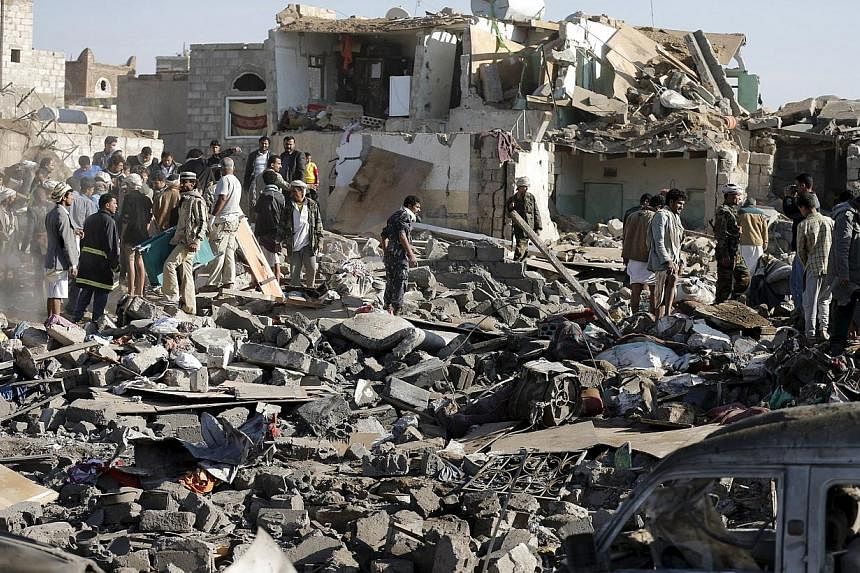KHOBAR, Saudi Arabia (Reuters) - Saudi Arabia has suspended international and domestic flights at seven airports in its south, the aviation authorities said on Thursday after Riyadh and allied Gulf governments launched air strikes against Houthi fighters in Yemen. The airports affected include Jizan, Abha and Wadi al- Dawaser, the General Authority of Civil Aviation said in a brief statement. It did not give a reason for the suspension or say when it might be lifted.
Yemen shut its major seaports on Thursday, industry and local sources said. "All major seaports were shut down on Thursday due to the rising conflict," said an industry source. Local sources in Yemen confirmed the closure. Yemen exports about 1.4-1.5 million barrels of Masila crude each month, mainly to China.
A ground offensive may be needed to restore order in Yemen, a Saudi source familiar with defence matters said on Thursday, hours after the kingdom began spearheading a campaign of air strikes against Iranian-allied Houthi militia. "We can't get our objectives in restarting the legitimate government by controlling the sky of Yemen ... a land offensive might be needed to restore order," the source told Reuters.
The Iranian Foreign Ministry demanded an immediate halt to all military "aggressions" in Yemen and warned that it might further complicate the crisis, the semi-official Fars news agency reported on Thursday. "Iran wants an immediate halt to all military aggressions and air strikes against Yemen and its people... Military actions in Yemen, which faces a domestic crisis,... will further complicate the situation... and will hinder efforts to resolve the crisis through peaceful ways," Fars quoted Foreign Ministry spokesman Marzieh Afkham as saying.
Iran denies providing money and training to the Shi'ite Houthi militia in Yemen, as alleged by some Western and Yemeni officials.
Brent crude oil shot up nearly 6 per cent on Thursday after Saudi Arabia and its Gulf Arab allies began a military operation in Yemen, although importers saw little immediate threat to supplies.
The strike against Houthi rebels, who have driven the president from Yemen's capital Sanaa, could stoke concerns about the security of Middle East oil shipments.
Oil prices jumped as traders and importers said they were worried the Saudi attack was a sign that fighting in the oil-rich Middle East was out of control and spreading.
Brent futures had risen more than US$3 a barrel to as high as US$59.78 a barrel just before 8am GMT, up almost 6 per cent since their last settlement. US crude was also up more than US$3 at US$52.35 a barrel.
The risk from the attack in Yemen was heightened because the Houthis have received some support from Iran, Saudi Arabia's long-time rival for dominance in the Middle East.
China's Foreign Ministry said on Thursday it was deeply concerned about the worsening situation in Yemen.
Ministry spokesman Hua Chunying told a news conference that China urged all parties to act in accordance with United Nations Security Council resolutions on Yemen, and to resolve the dispute through dialogue. "The Saudis have taken military action because they have said the Houthis are getting support from the Iranians," said Mr Li Guofu, director of the Centre for Middle East Studies at the China Institute of International Studies.
"This is an indication that the war may gradually spread into a regional conflict. This is something the Chinese government is very much concerned about."
Beyond oil, the Middle East is also the world's biggest exporter of liquefied natural gas (LNG), from Qatar and also Yemen, but importers said they were not immediately worried. "Gas supply from Yemen has no disruption so far. We are not concerned given the supply surplus and weak demand currently," said Mr Lee Sang Wook at Korea Gas Corp.
Like oil, LNG prices have fallen by more than half in the last 10 months as surging output has been met with slowing economic growth, especially in Asia.
With the global crude glut built up from US shale oil and strong output from producers such as Russia, there is little immediate worry about any shortages developing.
"Just because Saudi and others conducted air strikes doesn't mean the oil market becomes suddenly tight," said Mr Masaki Suematsu, manager of the energy team at brokerage Newedge Japan in Tokyo, although he cautioned that the conflict could spiral further beyond the airstrikes.
Some analysts said the strikes could lead to more stability in the region, if it resolved the conflict in Yemen. "If this is a prelude to a bigger operation in the Middle East, that may lead to some stability in the region," said Mr Mari Iwashita, chief market economist at Tokyo's SMBC Friend Securities.
Asian officials also said the fighting occurred near the Red Sea, waters that Arab Gulf supplies do not pass on their way to Asia. European importers may be more concerned as Arab producers have to ship oil past Yemen's coastlines via the Gulf of Aden to get to the Suez Canal.
The waters between Yemen and Djibouti, at less than 40km wide, are considered a "chokepoint" to global oil supplies by the US Energy Information Administration and the region is heavily militarized by western navies.
The United States and France both operate large military bases in Djibouti, and China also plans to open a base in the strategically well placed but small country in East Africa.
Nato's anti-piracy fleet also operates from the Gulf of Aden.

